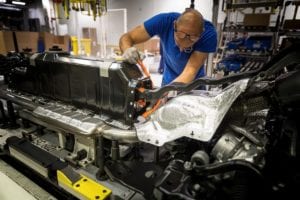Blockchain technology, which establishes a transparent and reliable shared data network, significantly boosts transparency of the raw material supply chain as the information about the material’s origin cannot be changed undetected. The benefits of blockchain are increasingly important for manufacturers and consumers looking to improve the sustainability of raw materials. Two new development deals this week further underlined the importance of transparency in the supply chains for renewable fuels and battery materials.
Firstly, Gevo, Inc. (Englewood, Colo.; www.gevo.com) has signed a Development Agreement with Blocksize Capital, a Leading Distributed Ledger Technology (DLT) company based in Germany.
Originally developed as an underlying branch of the blockchain technology, DLT is an immutable tool that allows tracking of data with a product and the transactions associated with the product. Gevo and Blocksize discovered that it is possible to attach the key metrics for sustainability to gallons of fuel, and therefore enable a “sustainability” assurance that has not yet been seen. The data associated with certain key metrics for measuring sustainability are suitable for being digitized through blockchain and could lead to tokenization or those attributes.
“One of the key principles of sustainability is to ‘measure, then improve’. DLT will enable us to sort out what truly is valuable in the end market, assigning the correct value to it, and then set up market mechanisms to share value upstream in the value chain. We want to create a system that rewards the value chain for improving its sustainability. Done right, we should be able to bring some of that value back to the farmer creating rewards for managing sustainability in agriculture. Obviously we’ll target our ethanol, isobutanol, isooctane, and jet fuel first, but this type of tokenization system could be applied to protein and feed, as well as chemicals, and food production too,” stated Patrick Gruber, Chief Executive Officer of Gevo.

Sustainably sourcing materials is part of Volvo’s new climate plan (Source: Volvo)
Also announced this week, Volvo Cars will become the first carmaker to implement global traceability of cobalt used in its batteries by applying blockchain technology.
Traceability of raw materials used in the production of lithium ion batteries, such as cobalt, is one of the main sustainability challenges faced by car makers.
Volvo Cars has now reached an agreement with its two global battery suppliers, CATL of China and LG Chem of South Korea, and leading global blockchain technology firms to implement traceability of cobalt starting this year.
Technology firms Circulor and Oracle operate the blockchain technology across CATL’s supply chain following a successful pilot earlier this summer, while the Responsible Sourcing Blockchain Network (RSBN), together with responsible sourcing specialists RCS Global and IBM, is rolling out the technology in LG Chem’s supply chain.
“We have always been committed to an ethical supply chain for our raw materials,” said Martina Buchhauser, head of procurement at Volvo Cars. “With blockchain technology we can take the next step towards ensuring full traceability of our supply chain and minimising any related risks, in close collaboration with our suppliers.”
A blockchain is a digital ledger containing a list of records linked to each other via cryptography. Within supply chains, the technology creates records of transactions which cannot be changed, while also enforcing a common set of rules for what data can be recorded. This allows participants to verify and audit transactions independently.
In this particular case, data in the blockchain include the cobalt’s origin, attributes such as weight and size, the chain of custody and information establishing that participants’ behavior is consistent with OECD supply chain guidelines. This approach helps create trust between participants along a supply chain.
CATL and LG Chem are renowned battery manufacturers, both with long and successful track records supplying lithium ion batteries to the global automotive industry. They fulfil Volvo Cars’ strict sourcing guidelines in terms of technology leadership, responsible supply chains, reduction of carbon emissions and competitive cost models.
The agreements between Volvo Cars, CATL and LG Chem cover the supply of batteries over the coming decade.